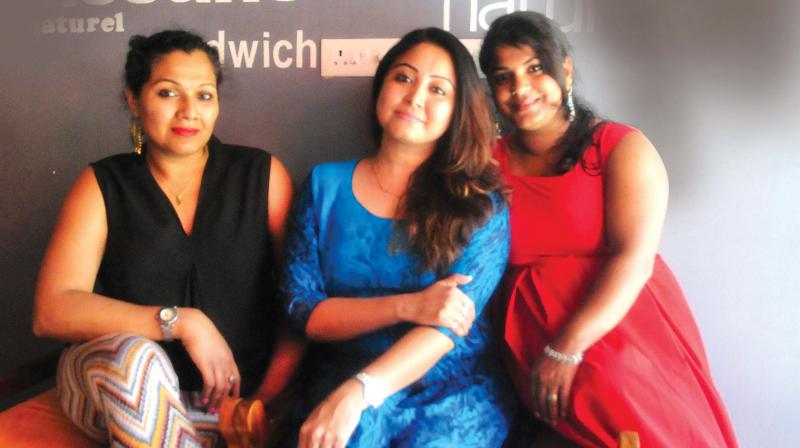She's the boss
A horde of challenges await a woman entrepreneur who is out to conquer a male-dominated domain.

They were two young women beginning a new business together. Trupthi Panickor and Nayana Nambiar are architects who had decided to start an architecture business in India, designing buildings for their clients. But when it came to payment time, they would just be taken in circles. Trupthi was away and Nayana was the quiet type. They wondered what they were doing wrong till they spoke to a few friends and realised that apparently some people thought that women wouldn’t really do anything if you didn’t pay them what was promised. If there was a guy, they thought there would be someone to go after them and question them, so they paid. So Trupthi and Nayana included a guy in the team — Fayez Mohammed. They became FNT Architects and Interiors with clientele in Kannur, Bengaluru, Thiruvananthapuram and the US.
“There are men who stand by us and help us just as much as there are others who pull us down,” Trupthi says ahead of Women’s Day when we spoke about the space women entrepreneurs enjoyed in Kerala. It depends on a lot of aspects – the field you work in, the people you interact with, and most importantly your support system.
Bavani Srinu had a good support system when she co-founded SWAPP, a mobile-app platform to help SMEs in Thiruvananthapuram. Originally from Chennai, she had lived in Bengaluru, Delhi, Dubai and Singapore before moving to Kerala and settling here with her family. Once her child was three months old, Bavani took the little one to her office and began working again. Career meant a lot too much to her. “I was raised in a joint family in a woman-dominated household. It was mostly aunts and sisters and mother. So you end up doing things not knowing if it is a man’s job or a woman’s. You fix your light bulbs and jump into the water tank to see if there is water,” she says.
All that helped her become confident. Her experience living in multi-cultural societies too gave her an edge.
She had faced discrimination against being an Indian in Dubai. She was not easily shaken when she moved back to India and there were skeptics looking at a woman entrepreneur. “You just have to take extra effort to shine through. They don’t take you seriously at first but then give it time, and the attitude changes. And I am not someone who quits easily,” says Bavani who can easily speak in Malayalam. Picking up the language would help her blend in more easily, she says.
For a lot of women a most difficult decision to make when they reach motherhood is choosing between family and career. For Madona Sarkar, a freelance makeup artist who moved to Kerala five years ago, the choice had been easy. She chose to raise her baby girl for four years before picking up from where she left off. “A lot of people would tell you, those four or five years you give to your child, would take you out of the market. But I believe there is always a comeback. I have seen my friends feeling insecure about not working, looking after the newborns. I tell them to be happy with whatever choice you make – career or family,” says Madona.
“I once dated a guy who would always tell me you are not doing anything with your life. I was then a singer by profession. But I didn’t want to be one. My passion was in beautifying someone, I could be at it for 24 hours. I took my ex’s criticism seriously,” Madona remembers. Later when she got married, her husband Pratap, who rarely called something good, looked at her work and told her she is really passionate about it, that she should do it. That support system is really important, both Madona and Bavani say. Her husband too had been really supportive, Bavani says.
Even with the support system, Madona had not always found it easy, especially with other women, who were her customers and were skeptical of her work. “I have plenty of patience, I am not in a hurry. I go down on my knees. When they see my work, they are happy.”
Joining us in the discussion is Kalpana Suseelan, who has started a boutique called Kashida in Thiruvananthapuram. She had started off as a dancer. She was the one who introduced Salsa classes in Kochi a few years ago. But an accident forced her to close down the studio. She faced her critics with a smile on her face. “Smile works,” she says. “When I thought of starting Kashida, there were people who asked – can Kalpana do business – but once they see my work, they are convinced.” Kalpana remembers how when she first held her salsa session on a terrace in Kochi, 30 couples had turned up, seeing a small ad on a paper. Even when many were doubtful if it would work in Kerala, Kalpana wanted to give it a shot. The same way she leapt into interior designing after closing down her dance studio. And now the boutique. “My biggest support is my sister, she is my canvas,” she says about Archana Suseelan, who is also an actor.
All these women highlight the importance of their supportive friends and family. Deepa Ananthapadmanabhan, a social worker and entrepreneur says, “I have found it easy to stand my ground and speak till now. But I feel it’s greatly related to my age and circles more than often. If I were an entrepreneur with passion and ideas but not much communicative skills and certain level of family support, it would be frankly a little difficult in Kerala to launch and sustain an enterprise. It would greatly depend on how much one can fight against and strive for.”

